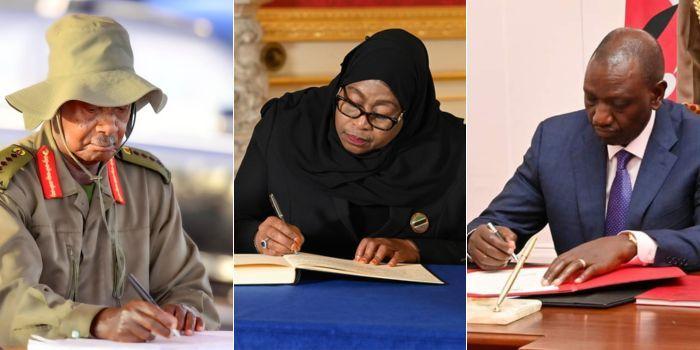Why Museveni, Suluhu Did Not Sign EU Deal Like Ruto
Rebeccah Miano, the Trade Cabinet Secretary, mentioned that other nations in the East African Community decided not to sign the Economic Partnership Agreement (EPA) with the European Union due to several reasons, including the requirement for more time to evaluate the terms and conditions.
On Wednesday during an interview on KBC, the CS mentioned that several nations in the EAC were similarly hesitant to sign the agreement simultaneously with Kenya.
The CS mentioned that discussions aimed at enabling the agreement’s signing with EAC nations occurred nearly ten years ago.
Previous information suggested that certain East African Community (EAC) nations were against Kenya’s endorsement of the agreement. They argued that it would grant Kenya an unjust edge by allowing goods from the region to pass through the country more favorably.
Moreover, they also mentioned that endorsing the agreement by President William Ruto’s administration would violate the EAC Customs Union and the Common Market Protocol, which encourage the movement of goods among Kenya and other EAC nations.
In her statement, CS Miano highlighted that Kenya opted to proceed with the agreement following discussions with the Heads of State from the EAC. During the meeting, the nations agreed to individually interact with the EU instead of collectively as a unified community.
Other EAC countries, however, may choose to sign the deal at a later time, according to the CS.
“The discussions then were between EU and the whole of East Africa Community, but along the line, some countries may not have been ready to progress to the level of signature and ratification”, the CS told KBC.
ALSO READ:
- “Two Groups, One Agenda”: Gachagua Accuses Raila of Secret Political Deals
- Exclusive: Ida Odinga’s 75th Birthday Party in Karen (Photos)
- FKF President Discloses Exact Amount Paid to Harambee Stars Players
- Gachagua’s Ally Senator John Methu Admits Ruto Might Win 2027 Elections
- Maraga Explains Why He Hasn’t Campaigned in Kisii Despite 2027 Bid
Earlier, she had told the East African that, “Yes, they will accede to the current document as individuals or as groups. The document actually anticipates that this will happen and is designed to ease such entry.”
The Economic Partnership Agreement between Kenya and the EU signifies a significant milestone for the country, enabling the unrestricted export of processed, high-value goods such as finished products, vegetables, fruits, tea, coffee, and flowers, marking a pivotal moment in Kenya’s trade relations.
Further, down the line, the agreement will also allow EU goods into the country under favorable terms.
On December 18, 2023, Kenya ratified a pact with the EU. The EU stands as Kenya’s primary export hub and ranks second as its largest trading associate, fostering a bilateral trade amounting to €3.3 billion in 2022—an escalation of 27 percent from the figures recorded in 2018.
The EPA offers a foundation to promote the generation of employment opportunities for both parties involved, alongside specific collaboration aimed at boosting Kenya’s economic progress.
The agreement has been labeled as the most ambitious trade deal the EU has ever entered into with a developing nation, incorporating extensive provisions focused on sustainability including climate and environmental protection, labor rights, and gender equality.
Why Museveni, Suluhu Did Not Sign EU Deal Like Ruto
